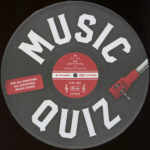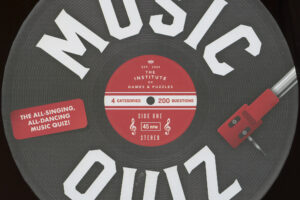It’s strange that things I thought were weird and didn’t like when I was a kid I still thing are weird — but now I like them.
It’s hard to take the position that the group — which was based on the idea that humankind and its societies are moving backwards — was not one of the most unique bands of the 1970s. The only other candidates among major bands that come to mind are Kiss and Parliament Funkadelic. The term was not in vogue then, but Devo was performance art.
Here is the beginning of the profile at the official website, Club Devo:
Recorded under the auspices of pioneering producer Brian Eno, 1978’s Q: Are We Not Men? A: We Are Devo! was seen as a call to arms by some and became an underground hit. Others found DEVO’s sound, imagery, and material threatening; Rolling Stone, for example, called the group fascists. But such criticism missed the point: DEVO dramatized conformity, emotional repression, and dehumanization in order to attack them, not to pay tribute to them.
More information is available from AllMusic.
One of new wave’s mos innovative and (for a time) successful bands, Devo was also perhaps one of its most misunderstood. Formed in Akron, OH, in 1972 by Kent State art students Jerry Casale and Mark Mothersbaugh, Devotook its name from their concept of “de-evolution” — the idea that instead of evolving, mankind has actually regressed, as evidenced by the dysfunction and herd mentality of American society. Their music echoed this view of society as rigid, repressive, and mechanical, with appropriate touches — jerky, robotic rhythms; an obsession with technology and electronics (the group was among the first non-prog rock bands to make the synthesizer a core element); often atonal melodies and chord progressions — all of which were filtered through the perspectives of geeky misfits. Devo became a cult sensation, helped in part by their concurrent emphasis on highly stylized visuals, and briefly broke through to the mainstream with the smash single “Whip It,” whose accompanying video was made a staple by the fledgling MTV network. Sometimes resembling a less forbidding version of the Residents, Devo‘s simple, basic electronic pop sound proved very influential, but it was also somewhat limited, and as other bands began expanding on the group’s ideas, Devo seemed unable to keep pace. After a series of largely uninteresting albums, the band called it quits early in the ’90s, and Casale and Mothersbaugh concentrated on other projects. (Continue Reading…)
It’s unfortunate that the last link is to an obit. Alan Myers, the drummer for a decade, died last July.
Above is “Freedom of Choice” and below is a rather unique cover of “[I Can’t Get No] Satisfaction.”










Recent Comments